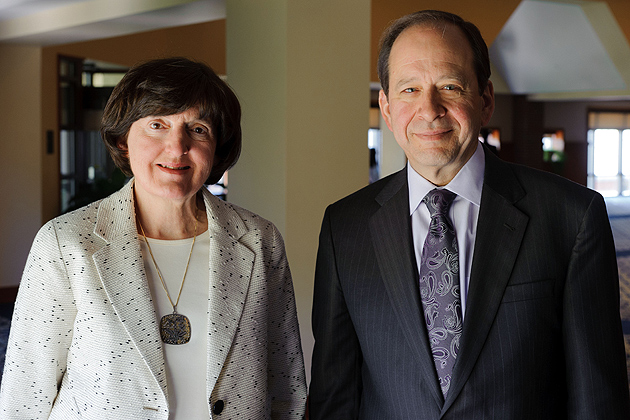
Two faculty members were named University of Connecticut Board of Trustees Distinguished Professors during the board’s April 25 meeting: Lynne Healy of the School of Social Work and Kent Holsinger from the Department of Ecology and Evolutionary Biology in the College of Liberal Arts and Sciences.
Healy is an internationally known scholar in the field of international social work and a nationally recognized leader, scholar, and educator in the profession of social work. She was a visiting professor at the University of the West Indies in Jamaica in 1994 and 1995; a visiting lecturer/consultant at the University of Mauritius; and has lectured at universities and conferences in 24 countries.
She is a prolific author with an exemplary national and international reputation for scholarship in the areas of internationalizing social work curriculum, international social work, human rights, human service agency management, and ethics. She has published 11 books and more than 50 articles and book chapters. Her writings on international social work have contributed significantly to defining and advancing the field of international social work and are widely cited. Several of her books have been translated into other languages.
She currently chairs the Administration Concentration and the International Issues Substantive Area at the School of Social Work, and co-directs the Center for International Social Work Studies. She teaches graduate courses in Supervision and Leadership; International Social Work; and International Development, Human Rights, and Social Policy; and advises master’s degree students.
She served on the Board of Directors of the Council on Social Work Education and as chair of the Council’s International Commission; held office as secretary and as vice president of the International Association of Schools of Social Work (IASSW); was on two federal review panels; and was chair of the Social Work Discipline Committee for the Fulbright program. She currently represents the IASSW at the United Nations and serves on editorial boards of five journals.
She was previously honored by the Council on Social Work Education with the Individual Award for Advancing Education for International Social Work (2004); by the Connecticut Chapter of the National Association of Social Workers as Social Worker of the Year (1987); and with an Outstanding Community Service Award from the West Indian Foundation (2010).
Holsinger is a professor of ecology and evolutionary biology and adjunct professor of statistics at UConn. He was elected a Fellow of the American Association for the Advancement of Science in 2003, and of the Connecticut Academy of Science and Engineering in 2010. In 2006, he received the Centennial Award from the Botanical Society of America, and the Distinguished Alumni Award from the College of Idaho in 2008.
He is well known for his work in population genetics, plant evolutionary biology, and conservation biology. His most influential work involves the development and analysis of mathematical models that describe the evolution of plant mating systems and of statistical models used to analyze genetic variation within populations. His most recent work on mechanisms responsible for the extraordinary diversity of plants in southwestern South Africa has uncovered a complex interplay between adaptation to environmental gradients and the accumulation of random differences among geographically isolated populations. This work involves students, post-doctoral research associates, faculty, and collaborators at the University of Connecticut, the University of California-Davis, the Australian National University, the University of Wageningen (Netherlands), the South African National Biodiversity Institute, and the South African Environmental Observation Network.
He regularly teaches an undergraduate course in evolutionary biology, and graduate courses in population genetics and conservation biology. For many years, he taught in the introductory biology course for biology majors, and for nearly 15 years, he co-taught a course in philosophy of science. In addition, he has served as an external reviewer of Ph.D. dissertations at four universities in the U.S., three in Europe, and two in Australia, and has served as the thesis advisor for four UConn Honors scholars and one University Scholar.
Holsinger recently served as chair of the Senate Executive Committee, stepping down when he took up his current position as interim vice provost for graduate education and dean of the Graduate School. He has served as president of the American Genetics Association, the American Institute of Biological Sciences, and the Botanical Society of America. Since 2000, he has served as chair of the Board of Directors of BioOne. He has served on grant and fellowship review panels for many federal agencies, and on the editorial board of 11 scientific journals.


